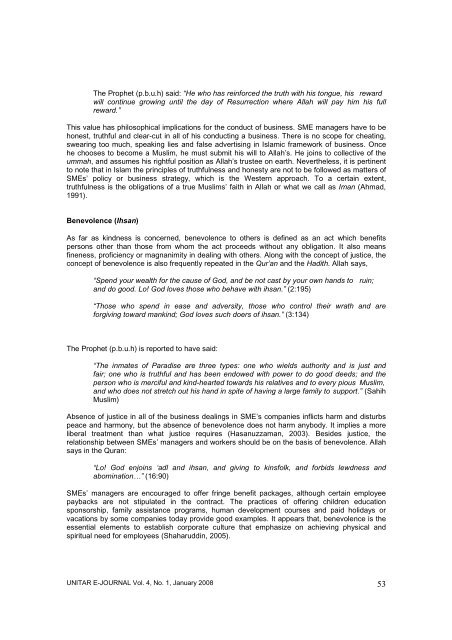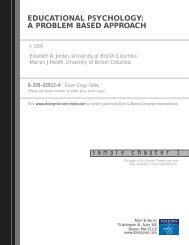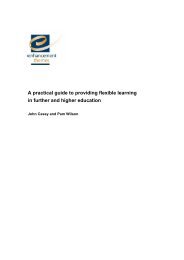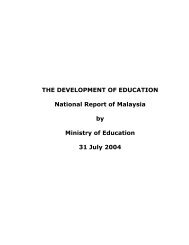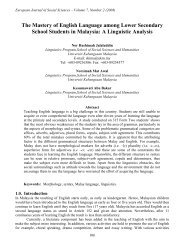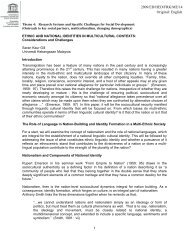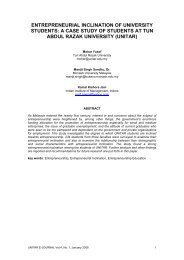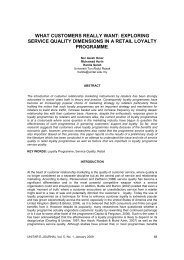An Analysis of Islamic Ethics in Small and Medium Enterprises (SMEs)
An Analysis of Islamic Ethics in Small and Medium Enterprises (SMEs)
An Analysis of Islamic Ethics in Small and Medium Enterprises (SMEs)
Create successful ePaper yourself
Turn your PDF publications into a flip-book with our unique Google optimized e-Paper software.
The Prophet (p.b.u.h) said: “He who has re<strong>in</strong>forced the truth with his tongue, his rewardwill cont<strong>in</strong>ue grow<strong>in</strong>g until the day <strong>of</strong> Resurrection where Allah will pay him his fullreward.”This value has philosophical implications for the conduct <strong>of</strong> bus<strong>in</strong>ess. SME managers have to behonest, truthful <strong>and</strong> clear-cut <strong>in</strong> all <strong>of</strong> his conduct<strong>in</strong>g a bus<strong>in</strong>ess. There is no scope for cheat<strong>in</strong>g,swear<strong>in</strong>g too much, speak<strong>in</strong>g lies <strong>and</strong> false advertis<strong>in</strong>g <strong>in</strong> <strong>Islamic</strong> framework <strong>of</strong> bus<strong>in</strong>ess. Oncehe chooses to become a Muslim, he must submit his will to Allah’s. He jo<strong>in</strong>s to collective <strong>of</strong> theummah, <strong>and</strong> assumes his rightful position as Allah’s trustee on earth. Nevertheless, it is pert<strong>in</strong>entto note that <strong>in</strong> Islam the pr<strong>in</strong>ciples <strong>of</strong> truthfulness <strong>and</strong> honesty are not to be followed as matters <strong>of</strong><strong>SMEs</strong>’ policy or bus<strong>in</strong>ess strategy, which is the Western approach. To a certa<strong>in</strong> extent,truthfulness is the obligations <strong>of</strong> a true Muslims’ faith <strong>in</strong> Allah or what we call as Iman (Ahmad,1991).Benevolence (Ihsan)As far as k<strong>in</strong>dness is concerned, benevolence to others is def<strong>in</strong>ed as an act which benefitspersons other than those from whom the act proceeds without any obligation. It also meansf<strong>in</strong>eness, pr<strong>of</strong>iciency or magnanimity <strong>in</strong> deal<strong>in</strong>g with others. Along with the concept <strong>of</strong> justice, theconcept <strong>of</strong> benevolence is also frequently repeated <strong>in</strong> the Qur’an <strong>and</strong> the Hadith. Allah says,“Spend your wealth for the cause <strong>of</strong> God, <strong>and</strong> be not cast by your own h<strong>and</strong>s to ru<strong>in</strong>;<strong>and</strong> do good. Lo! God loves those who behave with ihsan.” (2:195)“Those who spend <strong>in</strong> ease <strong>and</strong> adversity, those who control their wrath <strong>and</strong> areforgiv<strong>in</strong>g toward mank<strong>in</strong>d; God loves such doers <strong>of</strong> ihsan.” (3:134)The Prophet (p.b.u.h) is reported to have said:“The <strong>in</strong>mates <strong>of</strong> Paradise are three types: one who wields authority <strong>and</strong> is just <strong>and</strong>fair; one who is truthful <strong>and</strong> has been endowed with power to do good deeds; <strong>and</strong> theperson who is merciful <strong>and</strong> k<strong>in</strong>d-hearted towards his relatives <strong>and</strong> to every pious Muslim,<strong>and</strong> who does not stretch out his h<strong>and</strong> <strong>in</strong> spite <strong>of</strong> hav<strong>in</strong>g a large family to support.” (SahihMuslim)Absence <strong>of</strong> justice <strong>in</strong> all <strong>of</strong> the bus<strong>in</strong>ess deal<strong>in</strong>gs <strong>in</strong> SME’s companies <strong>in</strong>flicts harm <strong>and</strong> disturbspeace <strong>and</strong> harmony, but the absence <strong>of</strong> benevolence does not harm anybody. It implies a moreliberal treatment than what justice requires (Hasanuzzaman, 2003). Besides justice, therelationship between <strong>SMEs</strong>’ managers <strong>and</strong> workers should be on the basis <strong>of</strong> benevolence. Allahsays <strong>in</strong> the Quran:“Lo! God enjo<strong>in</strong>s ‘adl <strong>and</strong> ihsan, <strong>and</strong> giv<strong>in</strong>g to k<strong>in</strong>sfolk, <strong>and</strong> forbids lewdness <strong>and</strong>abom<strong>in</strong>ation…” (16:90)<strong>SMEs</strong>’ managers are encouraged to <strong>of</strong>fer fr<strong>in</strong>ge benefit packages, although certa<strong>in</strong> employeepaybacks are not stipulated <strong>in</strong> the contract. The practices <strong>of</strong> <strong>of</strong>fer<strong>in</strong>g children educationsponsorship, family assistance programs, human development courses <strong>and</strong> paid holidays orvacations by some companies today provide good examples. It appears that, benevolence is theessential elements to establish corporate culture that emphasize on achiev<strong>in</strong>g physical <strong>and</strong>spiritual need for employees (Shaharudd<strong>in</strong>, 2005).UNITAR E-JOURNAL Vol. 4, No. 1, January 2008 53


